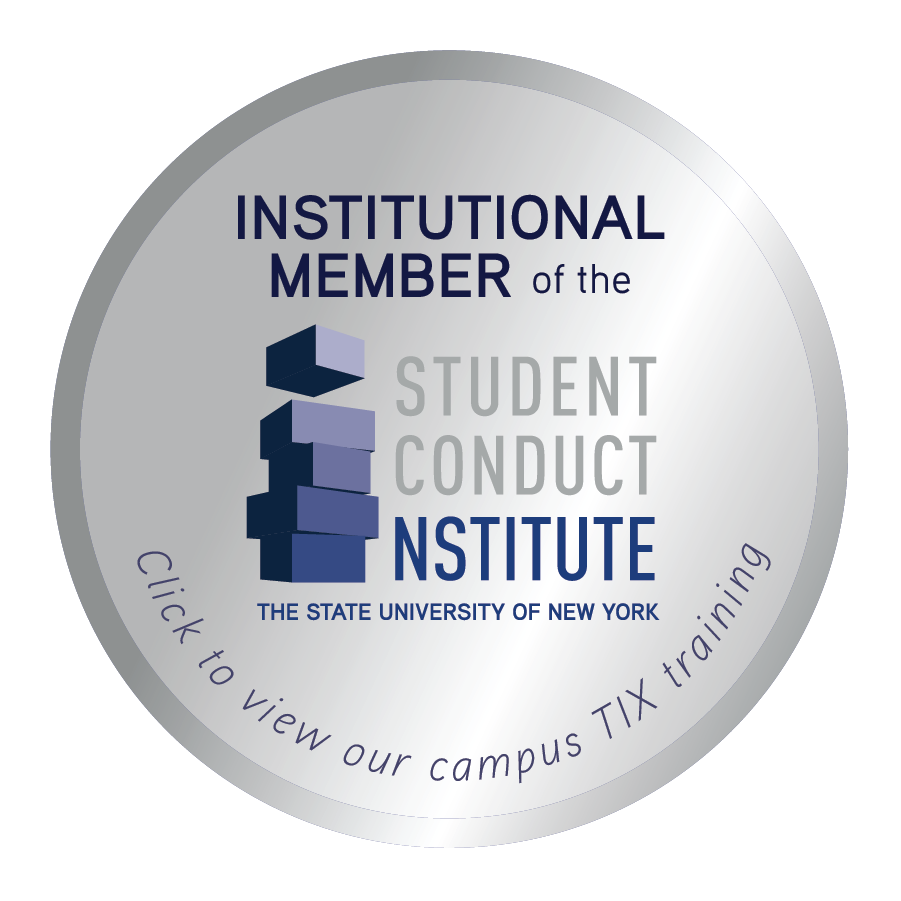Title IX FAQ
- What is Title IX?
- Who Enforces Title IX?
- Who is responsible for Title IX issues at California Lutheran University?
- Who is protected under Title IX?
- What conduct is prohibited by Title IX?
- Is it possible to be sexually harassed/assaulted by someone of the same gender?
- If an incident occurred at a party and I was drinking, will I get in trouble?
- Who does Title IX benefit?
- Does Title IX apply mostly to athletics?
- How do athletics comply with Title IX?
- Are Title IX rights granted to pregnant students?
What is Title IX?
Title IX of the Education Amendments of 1972 was the first comprehensive federal law
to prohibit sex discrimination against students and employees of educational institutions.
It is one of several federal and state antidiscrimination laws that define and ensure
equality in education. The regulations implementing Title IX, published in 1975, prohibit
discrimination, exclusion, denial, limitation, or separation based on gender. Title
IX states:
No person in the United States shall, on the basis of sex, be excluded from participation
in, be denied the benefits of, or be subjected to discrimination under any education
program or activity receiving Federal financial assistance.
Who Enforces Title IX?
The United States Department of Education’s Office for Civil Rights (OCR) is in charge of enforcing Title IX. Information regarding OCR can be found at http://www.ed.gov/about/offices/list/ocr/index.html.
Who is responsible for Title IX issues at California Lutheran University?
The university Title IX Coordinator can be reached at 805-493-3630 or via email at titleix@CalLutheran.edu.
Who is protected under Title IX?
Title IX covers faculty, staff and students in any educational institution receiving federal funding. These include local school districts, colleges and universities, for-profit schools, libraries, and museums. Vocational rehabilitation agencies and education agencies of all 50 states, the District of Columbia, and U.S. territories and possessions are also included. Title IX does not generally cover private educational institutions unless they receive federal financial assistance. In addition, music classes or choruses based on vocal range or quality, sex education classes, and sports involving bodily contact are exempt from Title IX requirements, as are religious institutions if implementation of this law would violate their religious tenets. Title IX also does not apply to admission to private undergraduate institutions.
What conduct is prohibited by Title IX?
In accordance with its obligations under the Title IX Regulations of 2020, the University prohibits sexual harassment, which is conduct based on sex, including gender identity, gender expression, or sexual orientation,that satisfies one or more of the following definitions:
- Quid Pro Quo Conduct. An employee conditions the provision of an aid, benefit, or service of the University on an individual’s participation in unwelcome sexual conduct;
- Unwelcome Conduct. Unwelcome conduct that is determined by a reasonable person to be so severe, pervasive, and objectively offensive that it effectively denies a person equal access to the University’s education program or activity; or
- Sexual assault. This category of prohibited conduct includes the following:
- Sex Offenses—Any sexual act directed against another person, without the affirmative consent of
the victim including instances where the victim is incapable of giving consent. Sexual
Act is defined as conduct between persons consisting of:
- Contact between the penis and the vulva.
- Contact between the penis and the anus.
- Contact between the mouth and the penis.
- Contact between the mouth and the vulva.
- Non-Consensual Penetration Actual or attempted penetration, no matter how slight, of the vagina or anus with any body part or object, or oral penetration by a sex organ of another person, without the affirmative consent of the victim. This includes forcible penetration and/or penetration against that person’s will or not forcibly or against the person’s will in instances where the victim is incapable of giving affirmative consent because of their temporary or permanent mental or physical incapacity.
- Fondling—The non-consensual touching of the private body parts of another person for the purpose of sexual gratification without affirmative consent, forcibly and/or against that person’s will or not forcibly or against the person’s will in instances where the victim is incapable of giving affirmative consent because of their youth or because of their temporary or permanent mental or physical incapacity.
- Other Lawfully Prohibited Sexual Intercourse
- This category includes conduct that does not meet the definition of Non -Consensual
Penetration or Fondling:
- Nonforcible sexual intercourse between persons who are related to each other within the degrees wherein marriage is prohibited by law, regardless of affirmative consent.
- Nonforcible sexual intercourse with a person who is under the statutory age of consent, regardless of affirmative consent.
- This category includes conduct that does not meet the definition of Non -Consensual
Penetration or Fondling:
- Sex Offenses—Any sexual act directed against another person, without the affirmative consent of
the victim including instances where the victim is incapable of giving consent. Sexual
Act is defined as conduct between persons consisting of:
- Dating violence.Violence committed by a person— (A) who is or has been in a social relationship of a romantic or intimate nature with the victim; and (B) where the existence of such a relationship shall be determined based on a consideration of the following factors: (i) The length of the relationship. (ii) The type of relationship. (iii) The frequency of interaction between the persons involved in the relationship
- Domestic violence. A felony or misdemeanor crimes of violence committed by a current or former spouse or intimate partner of the victim, by a person with whom the victim shares a child in common, by a person who is cohabitating with or has cohabitated with the victim as a spouse or intimate partner, by a person similarly situated to a spouse of the victim under the domestic or family violence laws of the state of California or by any other person against an adult or youth victim who is protected from that person’s acts under the domestic or family violence laws of the state of California.
- Stalking. Engaging in a course of conduct directed at a specific person that would cause a reasonable person to— (A) fear for their safety or the safety of others; or (B) suffer substantial emotional distress.
Is it possible to be sexually harassed/assaulted by someone of the same gender?
Yes. If you have been subjected to unwanted sexual contact or sexual harassment, your gender and the gender of the alleged perpetrator are irrelevant. Such conduct is prohibited by Title IX.
If an incident occurred at a party and I was drinking, will I get in trouble?
Cal Lutheran's priority is to prevent sexual harassment and sexual violence. While the specifics of the situation will be considered, Cal Lutheran’s primary focus will be to address the sexual harassment or violence. Cal Lutheran does not want the involvement of alcohol or drugs to prevent the reporting of such serious misconduct. Also, the use of alcohol or drugs will not excuse sexual violence or harassment.
Who does Title IX benefit?
Title IX benefits everyone. The law requires educational institutions to maintain policies, practices, and programs that do not discriminate against anyone on the basis of gender. Continued efforts to achieve educational equity have benefited all students by moving toward the creation of school environments where all students can learn and achieve the highest standards.
Does Title IX apply mostly to athletics?
Although it is the application of Title IX to athletics that has gained the greatest public visibility, the law applies to every single aspect of education, including admissions and recruitment, comparable facilities, access to course offerings, access to schools of vocational education, counseling and counseling materials, financial assistance, student health and insurance benefits and/or services, housing, marital and parental status of students, physical education and athletics, education programs and activities, and employment. Before Title IX was enacted, most colleges and universities emphasized sports only for male students. The educational opportunities of athletic programs were generally limited for women. Title IX has helped focus attention on the legal requirements of federally funded institutions to provide equal athletic opportunities for women. The result has been increased involvement of girls and women in sports at all levels.
How do athletics comply with Title IX?
Title IX requires that schools, which receive federal funding, provide equal opportunities for members of both sexes. It addresses the availability, quality and kind of benefits, and the opportunities and treatment that athletes receive. There are three basic aspects of Title IX as applied to athletics:
- Participation: Title IX is not a quota system. Every institution has three options to demonstrate
fairness in athletic opportunities. Schools can show that they comply with Title IX
if they can demonstrate any one of the following:
- Substantially proportionate athletic opportunities for male and female athletes;
- A history and continuing practice of expanding opportunities for the under-represented sex;
- Full and effective accommodation of the interests and abilities of the under-represented sex. Schools do not necessarily need to offer identical sports, yet they do need to provide an equal opportunity for females to play in sports of interest.
- Scholarships: The total amount of athletic aid (not applicable at Cal Lutheran) must be substantially proportionate to the ratio of female and male athletes. For example, consider a college with 90 female athletes and 115 male athletes and a scholarship budget of $100,000. An equitable distribution of funds would award $44,000 in scholarship aid to female athletes and $56,000 to males.
- Additional Athletic Program Components: Title IX also mandates equal treatment in the provision of:
- Coaching
- Equipment and supplies
- Game and practice times
- Locker rooms
- Medical and training facilities
- Practice and competitive facilities
- Publicity
- Recruitment of student athletes
- Travel per diem allowances
- Tutoring opportunities
The standard for compliance is one of quality rather than quantity. The actual amount of money spent on women's and men's programs may differ as long the quality of facilities and services for each program achieve parity. For example, equipment needed for men's football may cost more than equipment needed by women's field hockey. Title IX compliance is achieved as long as both teams are given equipment of comparable quality. However, Title IX is violated if a community builds a state-of-the-art field and locker facilities for males, but requires female athletes to share a field owned by a local community center. In this example, quality of facilities is far from equitable, and Title IX is violated.
Are Title IX rights granted to pregnant students?
Yes. Schools may not discriminate against an enrolled student in academic or non-academic activities because of pregnancy, birth of a child, false pregnancy, miscarriage, or termination of pregnancy unless the student opts to participate in an alternate, comparable activity.


